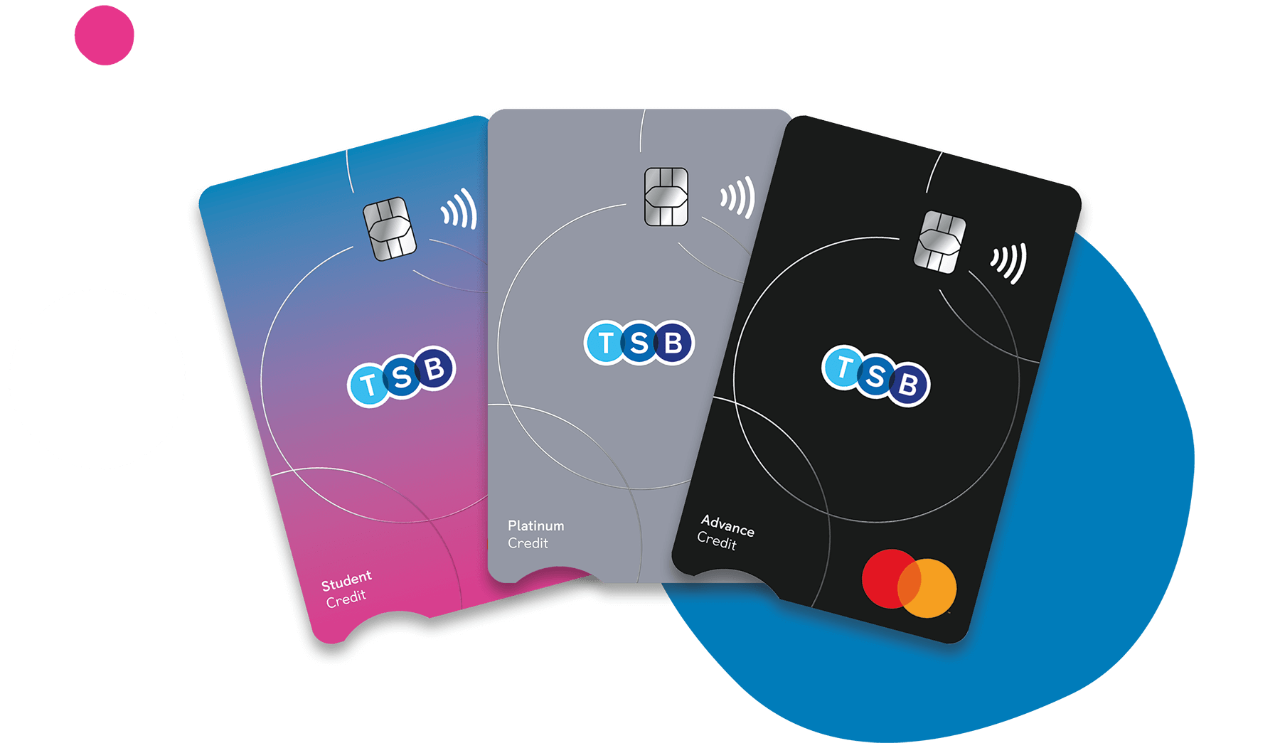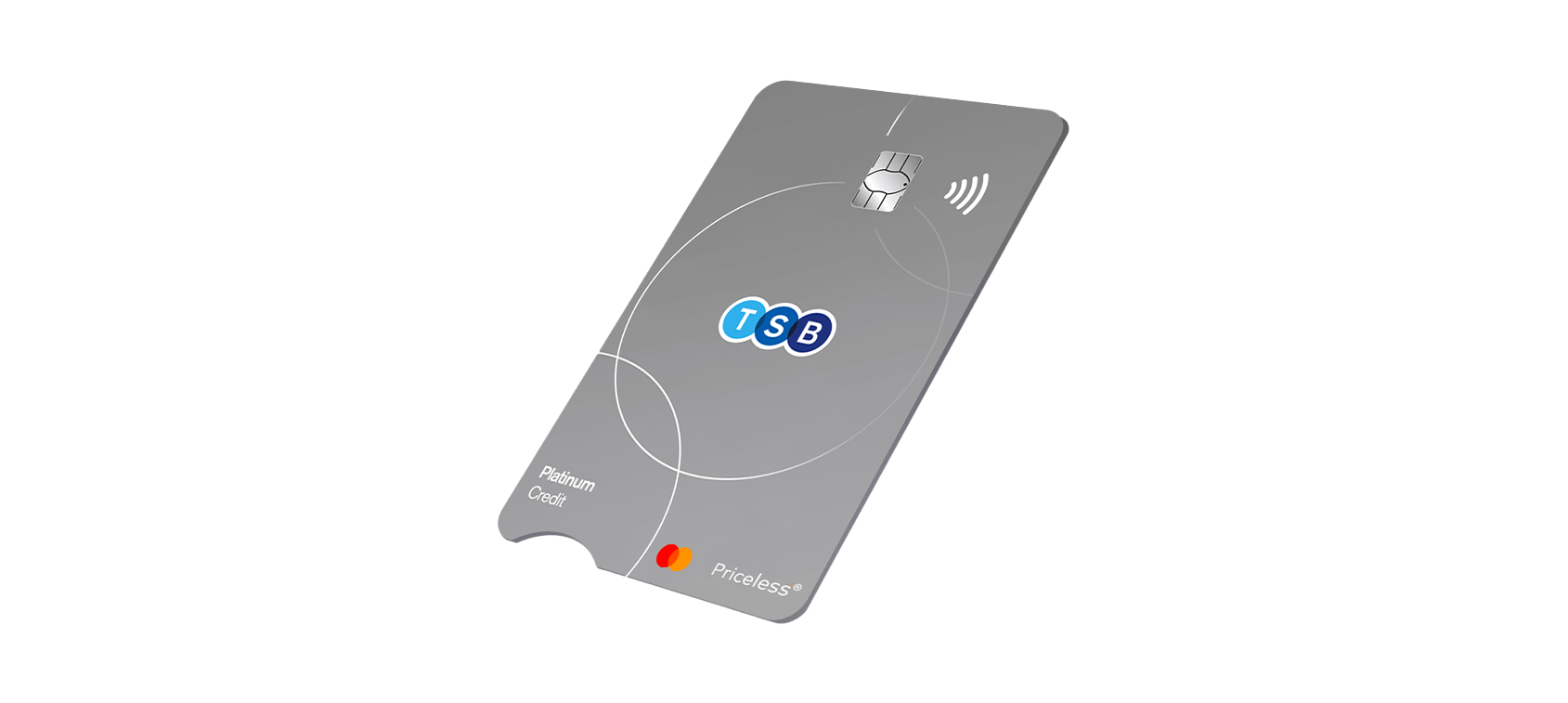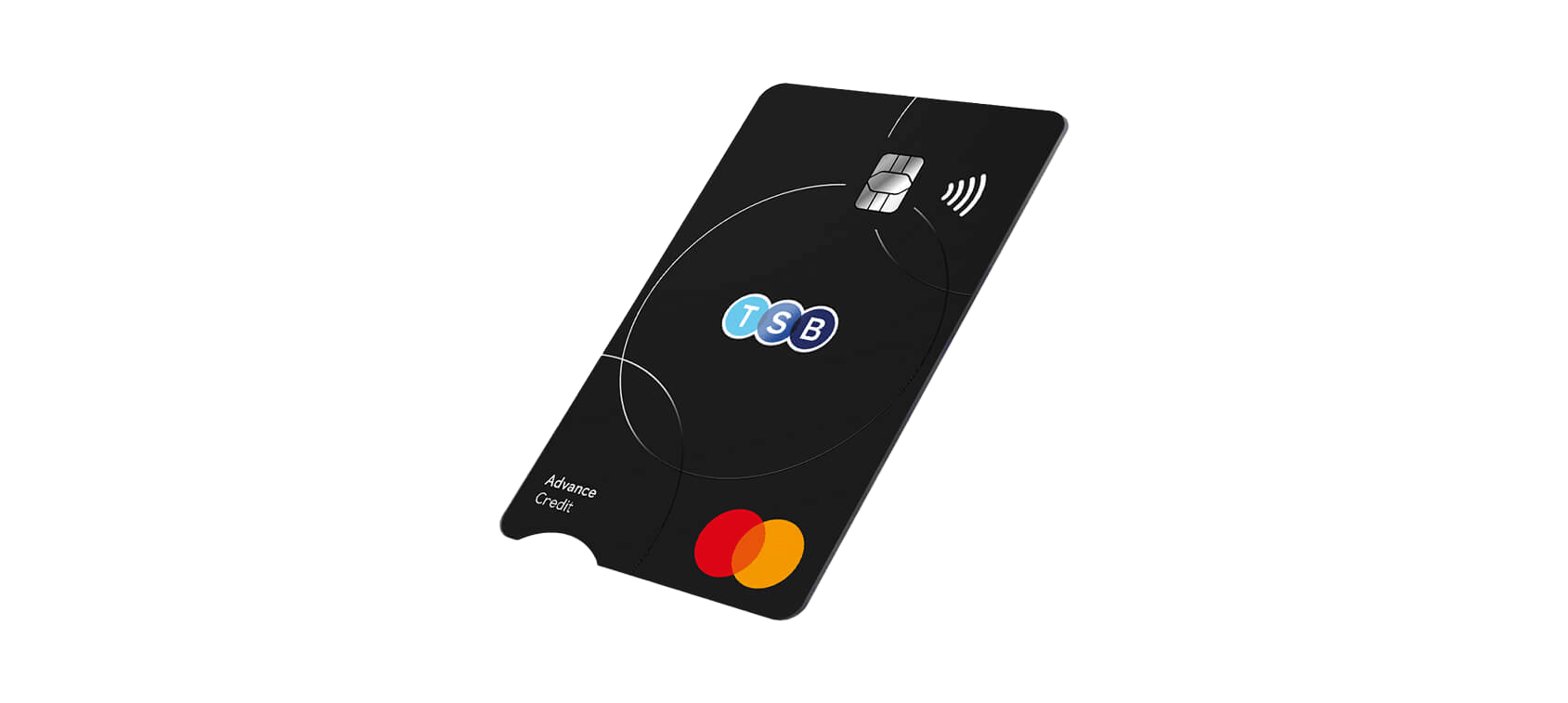Whether you’re transferring a balance, looking to spread out the cost of purchases, or need extra flexibility while studying, we have a credit card for you.

Compare credit cards
Platinum Balance Transfer Card
This is our longest 0% balance transfer deal.

Representative example
- Purchase rate 24.95% p.a. (variable)
- Representative 24.9% APR (variable)
Based on borrowing £1,200 over 12 months. Credit limits, promotional periods and interest rates will vary based on your individual circumstances.
To remain eligible for promotional rates you must stay within your credit limit and make your payments on time each month.
Platinum Purchase Card
Long 0% on Purchases and Balance transfers

Representative example
- Purchase rate 24.95% p.a. (variable)
- Representative 24.9% APR (variable)
Based on borrowing £1,200 over 12 months. Credit limits, promotional periods and interest rates will vary based on your individual circumstances.
To remain eligible for promotional rates you must stay within your credit limit and make your payments on time each month.
Advance Credit Card
Our lowest rate card for ongoing purchases.

Representative example
- Purchase rate 12.95% p.a. (variable)
- Representative 12.9% APR (variable)
Based on borrowing £1,200 over 12 months. Credit limits, promotional periods and interest rates will vary based on your individual circumstances.
To remain eligible for promotional rates you must stay within your credit limit and make your payments on time each month.
Student Credit Card
This is our card for students.

Representative Example
- Based on borrowing £1,200 over 12 months
- Purchase rate 21.95% p.a. (variable)
- Representative 21.9% p.a. (variable)
Improve your credit score
Understanding your credit score can improve your chance of being accepted for credit when you need it.
Credit card purchase protection
Certain purchases are protected by Section 75 of the Consumer Credit Act when you use your TSB credit card.
Money worries
If you’re struggling with your current financial situation, we can help.
Have you thought about...

Personal loans
For new and existing customers
- Non-TSB customers can apply for loans from £1,000 to £25,000
- TSB current account customers can apply to borrow £300 to £50,000
- Get a quote in 2 minutes and you could have the money on the same day

Overdrafts
For existing current account customers
- Arranged overdrafts are for short-term borrowing, if you need it
- Only pay interest for using your overdraft. There’s no cost to set it up
- You can ask to increase, decrease, or cancel your overdraft at any time
Credit Card FAQs
If you have a TSB current account:
Direct Debit
If you have the TSB mobile app you can log in, tap 'credit card account' then 'manage' then select 'set up or manage Direct Debit'. If the payment you've set up is less than the monthly minimum payment due, as shown on your statement, we will still have to take the minimum payment. Having trouble making payments? Visit our money worries support page.
Online if you have a TSB personal current account
Log in to Internet Banking or the TSB mobile app and select 'pay credit card'.
If you don't have a TSB current account, there are 5 ways to pay off your credit card balance:
Direct Debit
You can set up a Direct Debit to pay your monthly minimum payment, full statement balance, or a monthly fixed amount/percentage.
To do this, call Customer Services on 0345 603 0899 or chat to us in the TSB Mobile Banking App. Visit our Credit Card Payments page for more information.
If the payment you've set up is less than the monthly minimum payment due, as shown on your statement, we will still have to take the minimum payment. Having trouble making payments? Visit our money worries support page.
Alternative ways to set up a Direct Debit from a joint account
If you have the mobile app you can log in, tap 'credit card account' then 'manage' then select 'set up or manage Direct Debit'.
Alternatively, if you want to set up a Direct Debit from a joint account that requires two or more signatures, print the Direct Debit mandate and specify the amount you wish to pay – the monthly minimum payment, full statement balance, a monthly fixed amount, or fixed percentage – and post the form to:
TSB, Ingenuity House, Elmdom Trading Estate Bickenhill Lane B37 7HQ
Online
If you're a customer of a different bank, log into your account and make a payment to TSB, by using account number 00000000 and quoting the 16-digit long number from your credit card.
For long numbers beginning 540242 or 401066, it's sort code 30-28-94.
All other cards, it's sort code 77-48-31.
Phone
Call your bank, quote TSB account number 00000000 and the 16-digit long number from your credit card.
For long numbers beginning 540242 or 401066, it's sort code 30-28-94.
All other cards, it's sort code 77-48-31.
Bank giro credit
Fill in the tear-off slip at the foot of your credit card statement and post it to your own bank. Or post it with a cheque to TSB, Ingenuity House, Elmdom Trading Estate Bickenhill Lane B37 7HQ.
Cheque
Make it payable to TSB Bank plc followed by your 16-digit card number. Please also write your credit card number on the back of the cheque. Post it to TSB, Ingenuity House, Elmdom Trading Estate Bickenhill Lane B37 7HQ. Cheques take around 7 working days to process.
Book an appointment to discuss your credit card limit. Or you can call us to book an appointment.
Yes. For security, we'll send your PIN and your card separately. When your card arrives you'll need to sign it before you can start using it.
Yes, you can use your credit card abroad wherever you see the Mastercard logo. A non-sterling transaction fee of 2.95% of the transaction value (in pounds) applies to all transactions when TSB converts a foreign currency into pounds.
A fee of 3% (minimum fee of £3) applies to all cash withdrawals. If you withdraw cash in a foreign currency and TSB converts the foreign currency into pounds, then both the cash withdrawal fee and the non-sterling transaction fee will apply.
Find out more about our current credit cards here.
A balance transfer is when you move the debt from one or more existing credit card to a single credit card with a lower interest rate.
The benefits of making a balance transfer are that you will typically pay back less interest and you will make payments to a single credit card account.
Read our balance transfer guide
If you pay the full balance shown on your previous and current statements on time, you won’t be charged interest on any new purchases. This could give you an interest-free period of up to 56 days.
This only applies to purchases that are shown on your current statement. It does not apply balance transfers or cash withdrawals.
You can only get the 56 days’ interest-free period on new purchases if you repay the full balance shown on your current and previous statement. This means you’d need to pay back the full amount of your balance transfer, as well as all the other transactions on your statement, to benefit from this interest-free period.
How this works:
| Credit Card statement, dated 1st July | You pay the full balance by the payment due date of 25th July. |
| Purchases | You spend £100.00 on 1st July, and a further £120.00 on 15th July |
| Credit Card statement, dated 1st August | You pay the full balance of £220 by the payment due date of 25th August. |
| Interest-free period | You will not pay any interest on these purchases.
|
| This example assumes a minimum payment of 1% of the balance + interest (if you opened your account on or after 31 March 2011, that’s your minimum payment. For accounts opened before that, it’s 2% of the balance or 0.5% + interest, whichever is the greater). | |
Some of our credit cards have an introductory 0% interest offer that starts when you open your account. During this time, you won’t pay interest on purchases you make, even if you don’t repay the full amount each month. It is important to note that if you use your card for any balance transfers or cash withdrawals, you would still pay interest on those transactions during the 0% interest period for purchases.
When your introductory period ends, you can still get up to 56 days’ interest-free on new purchases when you pay off the full balance from your previous and current statements each month. This applies to all TSB credit cards.
For more information on how your payments affect your balance, see the FAQ ‘What happens if I don’t pay off the full balance?’
You’ll pay interest on any purchases from the date they’re added to your account until the date you pay them back in full. The exception to this is our credit cards with a 0% interest offer on purchases.
No. You can only get the 56 days’ interest-free period on new purchases if you repay the full balance shown on your current and previous statement. This means you’d need to pay back the full amount of your balance transfer, as well as all the other transactions on your statement, to benefit from this interest-free period.
| Credit Card statement, dated 1st July | You pay the £50.00 of a £1,000 balance transfer by the payment due date of 25th July. |
| Purchases | You spend £200.00 on 15th July. |
| Credit Card statement, dated 1st August | You pay £200.00 by the payment due date of 25th August. |
| Interest-free period | You won’t be able to take advantage of the interest-free period for this purchase as you have not paid the outstanding balance (the balance transfer) in full.
|
| This example assumes a minimum payment of 1% of the balance + interest (if you opened your account on or after 31 March 2011, that’s your minimum payment. For accounts opened before that, it’s 2% of the balance or 0.5% + interest, whichever is the greater). | |
To understand how your payments reduce your credit card balance, see the FAQ ‘ What happens if I don’t pay off the full balance?’
You’ll need to make at least the minimum monthly payment when there’s a balance on your credit card.
Important things to know:
- Your minimum monthly payment is shown on your credit card statement each month.
- Your statement will also tell you the date you need to make that payment by.
- You can see all the ways to repay your credit card here.
By only paying the minimum amount you’ll pay more interest overall. It will also take longer to clear your balance. Paying a little bit more each month, when you can afford it, could make a big difference.
| For example, if you owe £3000 on a credit card with an interest rate of 24% | ||
|---|---|---|
Minimum payment Starting at £85 a month and reducing over time.
|
Fixed payment At £85 a month.It’ll take you 4 years and 9 months to pay it off and cost you £1,824 in interest. A total cost of £4,824 You’ll save £3,391 |
Increased payment At £100 a monthIt’ll take you 3 years and 8 months to pay it off and cost you £1,365 in interest.
|
| These examples are taken from UK Finance’s free calculator and assume that you don’t spend any more on your card or have any fees and charges. They also assume a minimum payment of 1% + interest (if you opened your account after January 2011, that’s your minimum payment. For accounts opened before that, it’s 2% of the balance or 0.5% + interest, whichever is the greater). | ||
| See how changing your payments could help. Check your latest statement for your balance and interest rates. |
||
If you don’t make the minimum payment, your account will go into arrears. This will affect your credit file and make it more difficult to borrow money in the future. You may also lose any promotional rates that apply to your account.
If you need to, you can change the date that your monthly payments are due to a date that suits you better. To do this, you can:
- Call us on 0345 835 3846, lines are open from 8am to 8pm, 7 days a week
- Or visit us in branch
Money worries?
If you’re struggling to manage your repayments or borrowing, please talk to us as soon as possible. Together we can find a way to best help you. Visit our Money Worries page to see what support is available.
Every statement will show the next date your minimum monthly payment needs to reach your account by. This is your payment due date.
Can I make more than one payment each month? Yes, as long as you pay at least the minimum monthly amount by the payment due date.
Any payments you make before your next statement will go towards repaying the outstanding balance on the last statement you received.
For example, if you owe £750 on a credit card with an interest rate of 24%
| Credit Card statement, dated 1st July | Your balance is £750.00 with a minimum payment of £27.00 to reach your account by 25th July. |
| Payments | You pay £17.00 on 5th July. You pay £10.00 on 15th July. These 2 payments total the minimum payment due and have reached your account before the payment due date. You pay a further £50.00 on 26th July, after the minimum payment due date and before your next statement is produced. This payment will be used to repay more of the £750 balance on your Credit Card statement, reducing the amount of interest you’ll pay overall and clearing your balance more quickly. |
| This example assumes a minimum payment of 1% of the balance + interest (if you opened your account on or after 31 March 2011, that’s your minimum payment. For accounts opened before that, it’s 2% of the balance or 0.5% + interest, whichever is the greater). | |
For more information on how your payments affect your balance, see FAQ ‘What happens if I don’t pay off the full balance?’
If you don't pay the full balance on your statement, any payments you’ve made will repay the part of your debt with the highest interest rate first. If the payment covers all your highest interest debt, it’ll then pay the part of the balance with the next highest interest rate. This continues until it pays off the part of your balance with the lowest interest rate.
In this case, you’ll pay off the oldest balance transfer first and continue until you’re paying off the one added to your account most recently.
See section 6.1 of the terms and conditions for full details.
Yes. If you need to, you can change when your monthly payments are due to a date that suits you better. To do this, you can:
Use the TSB Mobile App
The fastest and easiest way is with the TSB Mobile App, here’s how:
- Log into your account
- Tap into your credit card account
- Tap on ‘Manage’
- Select ‘Change payment date’
- Follow the instruction on screen
Other ways
- Call us on 0345 835 3846, lines are open from 8am to 8pm, 7 days a week
- Or visit us in branch
Purchases
You won’t be charged interest on new purchases when you pay the full balance shown on your previous and current statement on time.
If you don’t make the full payment, interest is charged from the date the purchase is debited to your account until it’s paid in full.
Cash withdrawals
Interest is always charged on cash withdrawals from the date the withdrawal is debited to your account until it’s paid in full.
Balance transfers
If you have a promotional offer for balance transfers, you won’t be charged interest on this balance during that offer period.
If you don’t have a promotional offer, interest is charged from the date the balance transfer is debited to your account until it’s paid in full.
If your promotional offer has ended, interest is charged from the day after the promotional rate expires until your balance is paid in full.
No, we don’t charge a fee if you go over your credit limit, or you don’t make your minimum payment.
It’s important to note that:
- Missing payments or exceeding your credit limit will affect your credit file and make it more difficult to borrow money in the future.
- You may lose any promotional rates that apply to your account.
Money worries?
If you’re struggling with repayments, or your borrowing is getting difficult to manage, don’t put off talking to us so we can understand how best to help you. Visit our Money Worries page for ways we can help you.
Need any help?
Chat with us
Use the TSB Mobile Banking App to get help with queries 24/7.
Give us a call
Lines open 8am - 8pm Monday to Sunday.
Visit us in branch
It’s easy for you to pop in and manage your finances.
Important information
The representative APR is the Annual Percentage Rate of charge. You can use it to compare the overall cost of credit between different lenders.
The issue of a credit card is subject to status and depends on our assessment of your circumstances. You must be 18 or over and a UK resident to apply.


